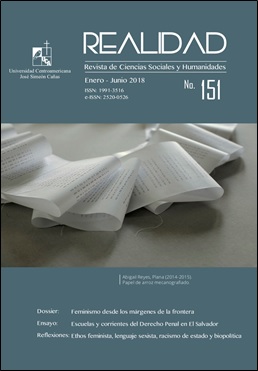Resumen
Este artículo aborda la construcción de la trayectoria intelectual de Amparo Casamalhuapa (1910-1971) en la década de 1930, como una mujer en disputa con la estructura social de El Salvador. Sus relaciones con dos figuras cruciales: su madre y el intelectual Alberto Masferrer, maestro y fundador del Vitalismo, marcan su relación con el espacio privado y el campo intelectual. Casamalhuapa se inserta en las redes intelectuales de su país gracias a la figura del mentor. Su verdadero contrapunto estructural se activa tras la muerte de su mentor, en 1932, cuando debe abrirse sola el camino en el campo intelectual. Su agudeza es notoria y la decisión de transgredir el espacio público dedicado a lo cívico la lleva a una postura mesiánica y disruptora del discurso de lo nacional oficial del gobierno del general Maximiliano Hernández Martínez. Esta denuncia política la llevará al exilio en 1939.
Realidad: Revista de Ciencias Sociales y Humanidades No. 151, 2018: 41-62

Esta obra está bajo una licencia internacional Creative Commons Atribución-NoComercial 4.0.
Derechos de autor 2018 Elena Salamanca





